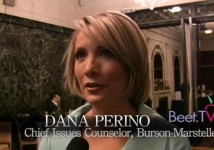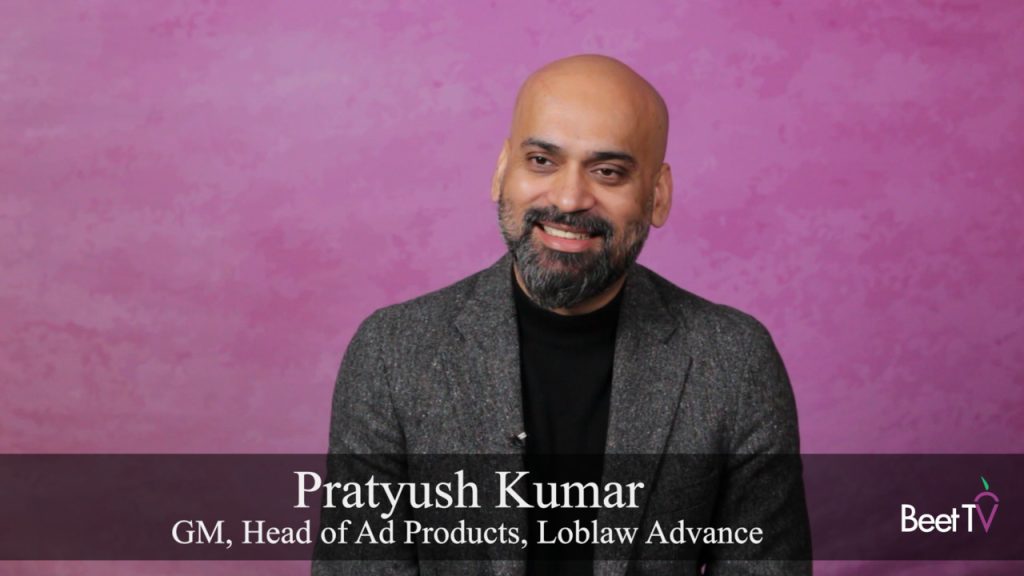
NEW YORK — Dana Perino, former White House Press Secretary to President George Bush, thinks that President Obama's use of online video for his weekly addresses is "great."
Perino, now a Fox News commentator and public relations executive with Burson-Marsteller, was in New York today as speaker in Federated Media's media and marketing conference. She was interviewed onstage by John Battelle.
HuffPo is Doing a Pretty Good Job
She had some nice things to say about the Huffington Post onstage and off in this interview. She told me the site is "rebuilding its reputation and dong a pretty good job."
Andy Plesser, Executive Producer
Video Transcript
Andy Plesser: What's happening with journalism and the transition, and I heard you, you know, discuss the transition with the Huffington Post and other media. Tell us how the ecosystem is changing.
Dana Perino: Well, the great thing about it is that it's changing all of the time and so there's not a lot of answers yet, there's just a lot of questions. But a lot of new media is trying to become…fill the void where traditional media is falling short, and that's a good thing. Look, people are getting their information from all different sorts of ways now. One thing that I'm concerned about, though, is that if you have a particular interest in one area or you have one political leaning, one side or the other politically, you might just be reading your side and it's important that people be able to broaden out–read a lot of different things. I check a lot of different blogs during the day as well as looking at more the traditional news media sites. I still am quite fond of the networks and the big national papers. And local papers continue to do very well. So people are getting their information in a lot of different ways, and the great thing is for communicators, like us at Burson, is that we can use that to then blanket coverage all over the place. It just means that you have to work a lot harder.
Andy Plesser: And how do you see the evolution of the Huffington Post?
Dana Perino: Well I've just noticed that they've tried to go for more of something that I think was first of all considered maybe more of a gossip blog or sort of a "news with edge" to more of a mainstream news site and they're getting a lot of credit, they're rebuilding their reputation, and I think they're doing a pretty good job.
Andy Plesser: So let's talk about crises and new media and a decentralized media. Coming out of your experience in the White House, what are your thoughts and advice in that area?
Dana Perino: Well things have started to move just so quickly. A crisis that you might have dealt with over a couple of weeks now happens within a couple of hours, so you have to have a team in place to be able to help you immediately scale up, stamp out a rumor, or deal with something, especially if it has to do with public health, to quickly be able to get information out, which is also a good thing. So if there's a food scare, you are able to let people know quickly, "Make sure you don't eat this or that that you might have in your cupboards." And that way you can get information out more quickly to people and hopefully save lives.
Andy Plesser: Tell us about this whole…you must have a lot of thoughts about the Supreme Court battle and how it's battled out in the press. Give us some of your thoughts on what's going on now.
Dana Perino: What's really interesting to me on the Supreme Court nomination is to watch blogs. They have journalists that are going through, looking at all the different opinions that she rendered as a judge over her career and it's very interesting. And sometimes the traditional media just doesn't have enough time to do it. They are trying to do more with less, and so they're looking at the blogs as well. So it almost becomes a symbiotic relationship. The one thing that has to happen, though, when you are looking at this information is you want to make sure that it's solid. So in traditional journalism with the ethics that are involved in finding two sources and making sure that they understand the rules of on background, off the record, that's all still very important, but the blogs are still playing a very important role in this new development.
Andy Plesser: Let's talk about YouTube for a minute and online video and viral video. That's a new phenomenon that has really come forward during your watch, I would say, or during the time that you were in the White House for good or bad. Tell us some of the impact of YouTube or viral video and how communicators can manage that, if they can.
Dana Perino: Well, a couple of things. One, it can be very good. I noticed that President Obama decided to take the radio address and turn it more into a video address that he does weekly and that's great. People love to watch video online and with more people having computers in their home and actually be able to access the internet through faster speeds, then you're actually able to watch video, so that has been a very good thing. On the downside, I know of a company who dealt with something where they had an employee that did something inappropriate, they put it on video, they put it on YouTube, and within 24 hours 800,000 people had watched that video and that can destroy a brand very quickly. So that's what we're trying to do at Burson-Marsteller, is help companies try to figure out, try to navigate that, how to be prepared for it and how to deal with it immediately when it happens.
Andy Plesser: Yeah, because it's almost the react through video. How can companies be prepared to react through video?
Dana Perino: Well they need to have some sort of freelancers on, on the speed-dial if they need to. And I think that CEOs and other people within companies should be doing more with video to their employees as well as to their customers and constitunts.


























